This is the third in a series of articles on the growth and impact of Chabad-Lubavitch worldwide.
Rabbi Levi and Adina Tiechtel couldn’t wait to get to work.
The young couple moved to Indiana just last month to start a Chabad House at Purdue University where they are serving the approximately 800 Jewish students enrolled there out of a total student population of about 40,000.
“We’d received positive feedback from administrators—strong support and encouragement,” says 25-year-old Rabbi Tiechtel, who is from the Crown Heights neighborhood of Brooklyn, N.Y. “Chabad has never had a permanent presence at this school, though there have been Chabad representatives who have visited. There was a demand from students, who wanted a stronger Jewish presence here.”
That permanent presence will now include Shabbat meals, classes, one-on-one Torah study, social events and holiday celebrations—whatever young adults need to add to their Judaism and their college experiences.
“We want to be their home away from home,” says Adina Tiechtel, 23, and originally from Toronto, Canada. “A student on campus can be very lonely; it’s a complicated time. They are trying to formulate their future and who they will be. We want to reach out to them, to be there for support in any way we can.”
As one of seven children, it’s something she knows well—listening to, talking with and offering support to others. It’s also second nature for her husband, who’s one of 13. Eight of his siblings also serve as shluchim—Chabad-Lubavitch emissaries—with three of them campus rabbis who have guided and advised him as he opens a Chabad House of his own.
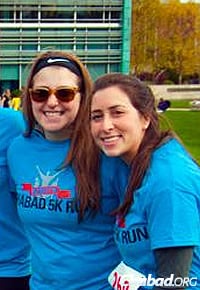
“This is a family tradition,” says Tiechtel. “It’s amazing that I get to join the club.”
That club has certainly gotten a lot bigger.
‘Positive, Lifelong Impact’
Chabad on Campus just rolled out an impressive new number: It has officially surpassed its 200th center—gone well beyond that, in fact—for a grand total of 220 centers worldwide.
In the last year alone, 33 Chabad-Lubavitch couples have settled themselves on college campuses in the United States, Canada, South America and Israel. Twenty-seven new Chabad centers have opened up, with another six couples having joined existing centers.
Chabad on Campus emissaries are now poised to teach, advise and offer Jewish programming to even more students and faculty, extending their reach farther than ever before.
“When today’s college student moves into the workplace and ultimately creates a home, his or her success—and ours—will depend on the values they take with them,” says philanthropist George Rohr, chairman of the Chabad on Campus International advisory board. “The positive, lifelong impact of the campus shluchim and shluchos—as teachers, mentors and role models, along with the ‘homes away from home’ that they create for a Jewish student—is incalculable.”
As for the Tiechtels, who arrived at Purdue with their 6-month-old baby Mendel, their decision to work with students was not as much about numbers, about quantity, as it was about quality—about trying to get to meet, know and advise young Jewish men and women, wherever they are on university grounds.
“The Rebbe [Rabbi Menachem M. Schneerson, of righteous memory] said that every person is a candle, and you only add—add to the light—until that light becomes a flame in itself,” explains Rabbi Tiechtel.
His wife adds that college students “want the opportunity to grow and learn; they have so much energy. You can see them change while they’re there. They feel empowered, and we want them to also be empowered by their Jewish heritage.”
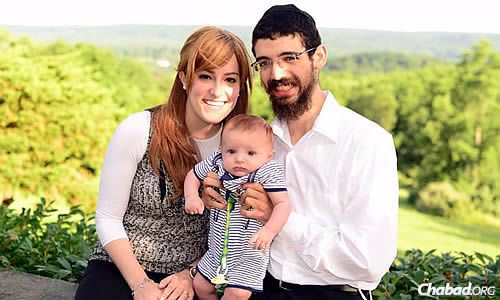
Centralized Resources for Emissaries and Students
Advising and connecting with young Jews at such a crucial time in their educational, social and spiritual lives has been an important part of Chabad’s outreach efforts and the reason for establishing Chabad on Campus International.
It’s part of the continued growth that began in the early 1950s. The Rebbe began sending rabbinical students to campuses to serve as a resource for students. Since the 1960s, Chabad campus centers have opened their doors to Jewish students, regardless of their backgrounds or observance levels.
Rabbi Moshe Kotlarsky, chairman of Chabad on Campus International and vice chairman of Merkos L’Inyonei Chinuch, the educational arm of the Chabad-Lubavitch movement, notes that this year “we are marking 20 years since the Rebbe’s passing. One cannot overstate the importance that the Rebbe placed on campus activities. As we reflect on the accomplishments of the past and the work to be done in the future, we are committed to ensure that Chabad on Campus continues to grow and expand in every way.”
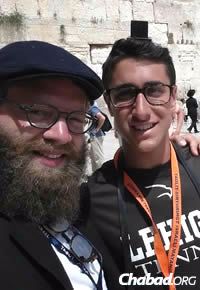
Those involved on the ground know how important this task remains.
“It is vital that Jewish students—at this transformative time in their lives—have the opportunity to be an integral part of a vibrant Jewish community,” says Rabbi Yossy Gordon, executive vice president of Chabad on Campus International. “That can mean attending holiday or Shabbat services, studying Torah individually or taking a larger class, having a kosher meal, or just getting time to unwind and socialize with other Jewish students. Young adults can get connected in a safe and nurturing environment during the years they spend at university.
“Chabad is very real for them,” he emphasizes. “It’s a place where they can grow in their Judaism, meet others with similar backgrounds and interests, and be themselves.”
A Focus on Dinners and Dialogue
In addition to Chabad on Campus centers popping up all over North America, Israel is seeing a boon in Chabad services at its secondary-educational institutions.
Rabbi Dovid Kurtz, director of the Israeli branch of Chabad on Campus International, assures that more are on the way. “In the past, Rabbi Gil Blizovski, who also serves as campus rabbi at Ben-Gurion University of the Negev, was among a handful of Chabad on Campus rabbis in Israel,” he explains. “However, in the past few years, many new shluchim have joined Chabad on Campus in Israel.
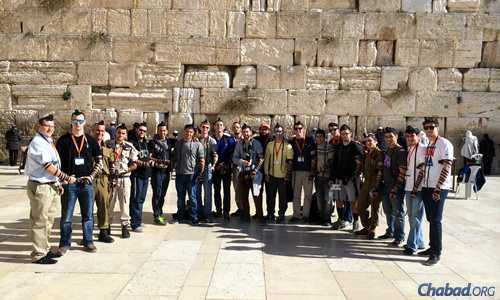
“In the last year alone, 21 new couples were added, joining the six who were here previously. In total, we now serve 23 campuses.”
At the Netanya Academic College, Rabbi Shneur Landa, who co-directs the Chabad on Campus there with his wife, Musya, says that “most of the students know Chabad from their post-army travels in Thailand, South America or India. So when they see us, they are really excited to reconnect and relive those experiences.”
Now starting their second year as emissaries—they set up shop last fall—he notes that hundreds of students filled out questionnaires on what they would like to see Chabad do on campus, with some very heartening results. “There was one girl who expressed her wish to be exposed the positive side of Judaism, often absent in Israeli media today, saying she knows she has a beautiful tradition, but has not yet had a chance to see it.”
With a student body of more than 4,000, Landa says that he and his wife, who are the parents of a young son and a new baby daughter, are in the midst of a busy year. In addition to giving JLI-accredited courses, they are planning programs and reaching out to students who remain on campus for Shabbat. While Shabbat dinners have long been a staple of Chabad centers on college campuses in North America, they remain somewhat of a novelty in Israel, where many students commute to classes and eat at home with their families on Friday night.
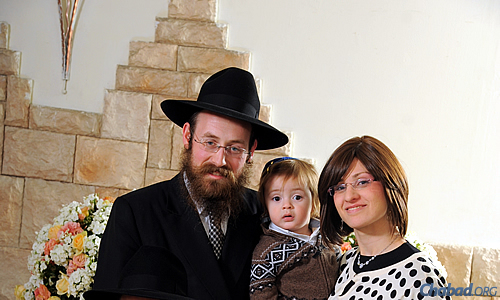
Still, says Landa, there are always those who stay on and near campus, and there are the international students who live in dorms, especially in Jerusalem, Tel Aviv and Haifa, so “a big focus for our centers in Israel is Shabbat meals on campus every Friday night.”
Rabbi Avi Weinstein, director of administration at Chabad on Campus International, looks forward to the continuing expansion of Chabad’s campus activities worldwide. “Having new centers around the world—and offering programs and classes to thousands of additional young men and women—is a tremendous step towards accomplishing our goal of being a resource to Jewish students, wherever they are pursuing their secondary education.”

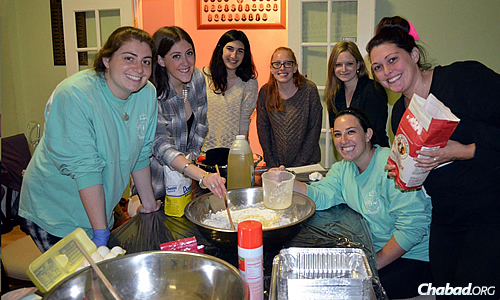
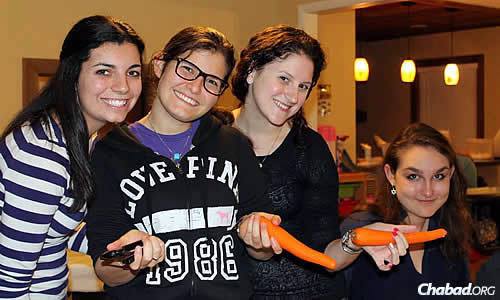









Join the Discussion